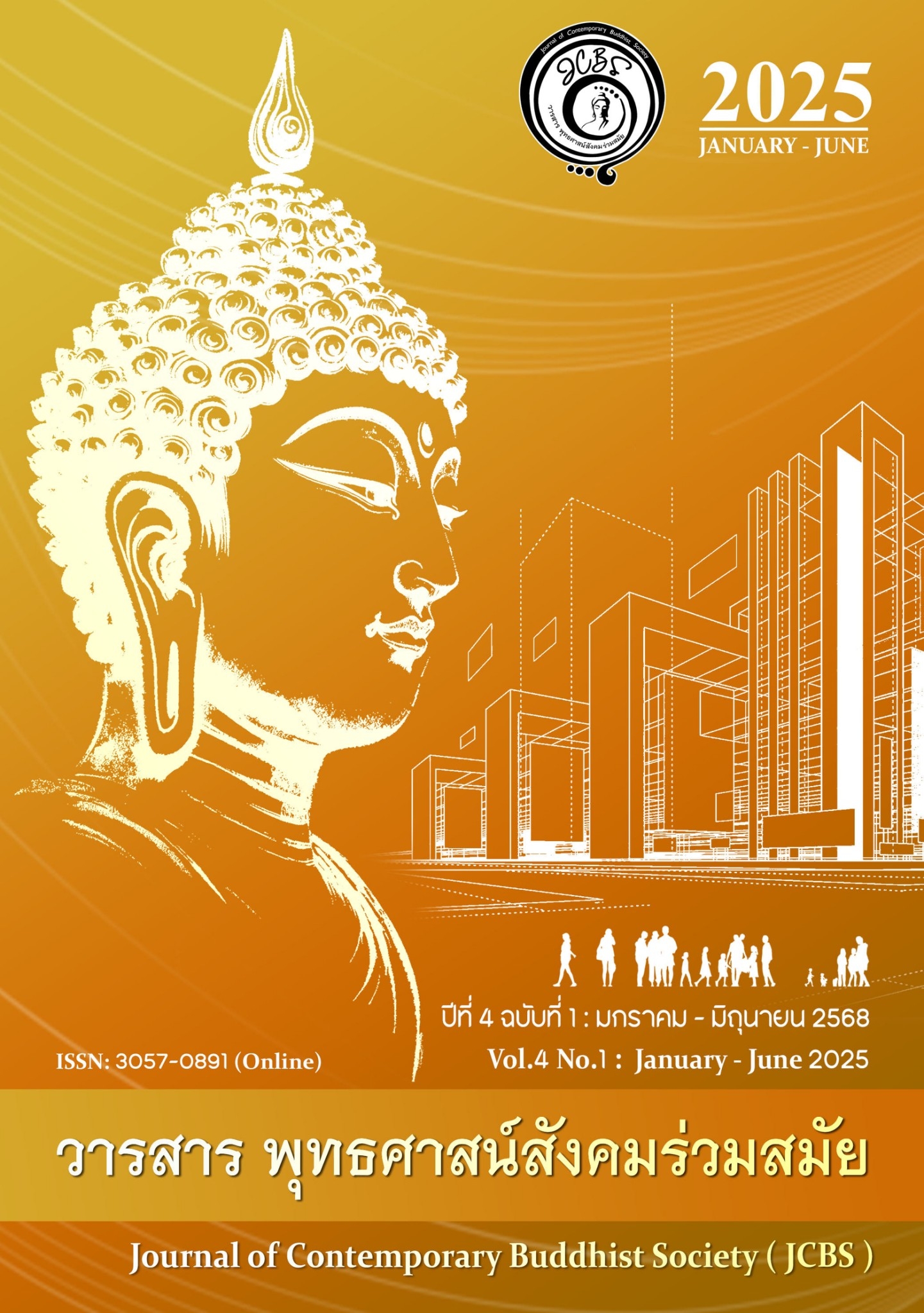พุทธนันทนาการ: มิติใหม่ในการพัฒนาคุณภาพชีวิตของผู้สูงวัยไทย
คำสำคัญ:
พุทธธรรม, นันทนาการ, ผู้สูงวัย, สุขภาวะ, คุณภาพชีวิตบทคัดย่อ
ประเทศไทยได้เข้าสู่สังคมผู้สูงวัยอย่างสมบูรณ์ ทำให้การพัฒนาคุณภาพชีวิตในมิติจิตวิญญาณและวัฒนธรรมกลายเป็นประเด็นท้าทายที่สำคัญ โดยเฉพาะอย่างยิ่งในบริบทที่พระพุทธศาสนาเป็นรากฐานของวิถีชีวิตไทยและมีบทบาทต่อกลุ่มผู้สูงวัย บทความนี้มีวัตถุประสงค์เพื่อสังเคราะห์แนวคิด “พุทธนันทนาการ” ในฐานะกรอบแนวคิดเชิงบูรณาการที่ผสานหลักธรรมพุทธศาสนาเข้ากับกิจกรรมนันทนาการ เพื่อเสริมสร้างสุขภาวะองค์รวมในด้านกาย จิตใจ สังคม และปัญญา ผ่านการสังเคราะห์วรรณกรรมและกรณีศึกษาที่หลากหลาย อาทิ โครงการศิลป์ส่องธรรม หอศิลป์พุทธะ และกิจกรรมชุมชน ซึ่งแสดงให้เห็นรูปแบบการบูรณาการหลักธรรมสำคัญ เช่น อริยสัจ 4 พรหมวิหาร 4 และสังคหวัตถุ 4 เข้ากับกิจกรรมทางศิลปะ วัฒนธรรม และสังคมที่เหมาะสมกับผู้สูงวัย บทความยังวิเคราะห์ปัจจัยความสำเร็จ ได้แก่ การพัฒนาผู้นำ การสร้างเครือข่าย และการออกแบบกิจกรรมที่ตอบสนองต่อบริบทเฉพาะ พร้อมเสนอข้อเสนอเชิงนโยบาย 5 ด้าน ได้แก่ การบูรณาการหลักธรรมในกิจกรรม การพัฒนาระบบสนับสนุน การส่งเสริมความร่วมมือ การขับเคลื่อนการวิจัย และการสร้างความตระหนักรู้ เพื่อผลักดันพุทธนันทนาการให้เป็นแนวปฏิบัติที่ยั่งยืนทั้งในระดับพื้นที่และระดับประเทศ
เอกสารอ้างอิง
Augustine (1991). Confessions. Trans, Henry Chadwick, Oxford University Press.
Colli, Ilario (2022). “Descartes' Cogito and the Birth of the Modern Self.” Ilario Colli, ilariocolli.com/articles/descartes-cogito-and-the-birth-of-the-modern-self.
Collins, Steven (1998). Selfless Persons: Imagery and Thought in Theravada Buddhism. Cambridge University Press.
Descartes, René (1996). Meditations on First Philosophy. Translated by John Cottingham, Cambridge University Press.p 33-34.
Gethin, Rupert (1998). The Foundations of Buddhism. Oxford University Press.
Gombrich, Richard (2006). What the Buddha Thought. Equinox Publishing Ltd.
Goodman, Charles (2019). Consequentialism: A Very Short Introduction. Oxford University Press.
Guenther, Herbert V (1974). The Tantric View of Life. Shambhala Publications.
Gunaratana, Henepola (2011). Mindfulness in Plain English. Wisdom Publications,.
Harvey, Peter (1990). An Introduction to Buddhism: Teachings, History and Practices. Cambridge University Press.
Hasenkamp et al(2022). "The Nature of Self Perspectives from Buddhism and Cognitive Science." Mind & Life Institute. https://www.mindandlife.org/insight/the-nature-of-self/.
Hume, David (2000). A Treatise of Human Nature. Edited by L.A. Skelton et al., Oxford University Press: Clarendon Press.
Kant, Immanuel (1997). Groundwork for the Metaphysics of Morals. Translated by Mary Gregor Cambridge University Press: Cambridge Texts in Philosophy.
Kenny, Anthony(2006). Descartes: A Study of His Philosophy. Random House.
Sangiacomo, Andrea. “Cogito, Sum Objectum: Descartes in a Buddhist Perspective.” 1 Feb. https://www.rug.nl/filosofie/organization/departments/history/gcmemt/blog/cogito_-sum-objectum_-descartes-in-a-buddhist-perspective?lang=en2019.
Nāgārjuna (1986). Madhyamaka Karika. Translated by David Kalupahana, State University of New York Press.
Siderits Mark et al (2007)., "Buddhism as Philosophy: An Introduction." Hackett Publishing Company.
Suzuki D.T.(1970), Zen Mind Beginner's Mind. Weatherhill Inc.
Thich Nhat Hanh (1999). The Heart of the Buddha's Teaching: Transforming Suffering into Peace, Joy, and Liberation. Broadway Books.
Wynne, Alexander (2002). The Buddha’s Philosophy: A Study in Early Buddhism. RoutledgeCurzon Press.
Descartes, R. (1996). Meditations on First Philosophy (J. Cottingham, Trans.). Cambridge University Press. (Original work published 1641)
Bhikkhu Ñāṇamoli, & Bodhi, B. (2001). The Middle Length Discourses of the Buddha: A Translation of the Majjhima Nikāya. Wisdom Publications.
Nāgārjuna. (1995). The Fundamental Wisdom of the Middle Way: Nāgārjuna's Mūlamadhyamakakārikā (J. L. Garfield, Trans.). Oxford University Press.
ดาวน์โหลด
เผยแพร่แล้ว
รูปแบบการอ้างอิง
ฉบับ
ประเภทบทความ
สัญญาอนุญาต
ลิขสิทธิ์ (c) 2025 วารสารพุทธศาสน์สังคมร่วมสมัย

อนุญาตภายใต้เงื่อนไข Creative Commons Attribution-NonCommercial-NoDerivatives 4.0 International License.





